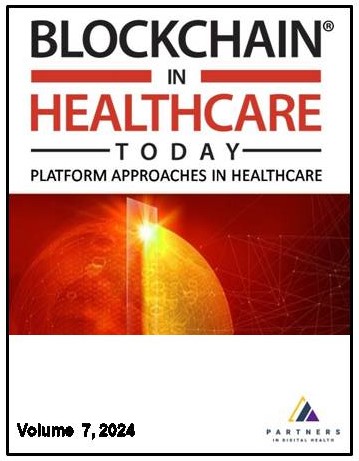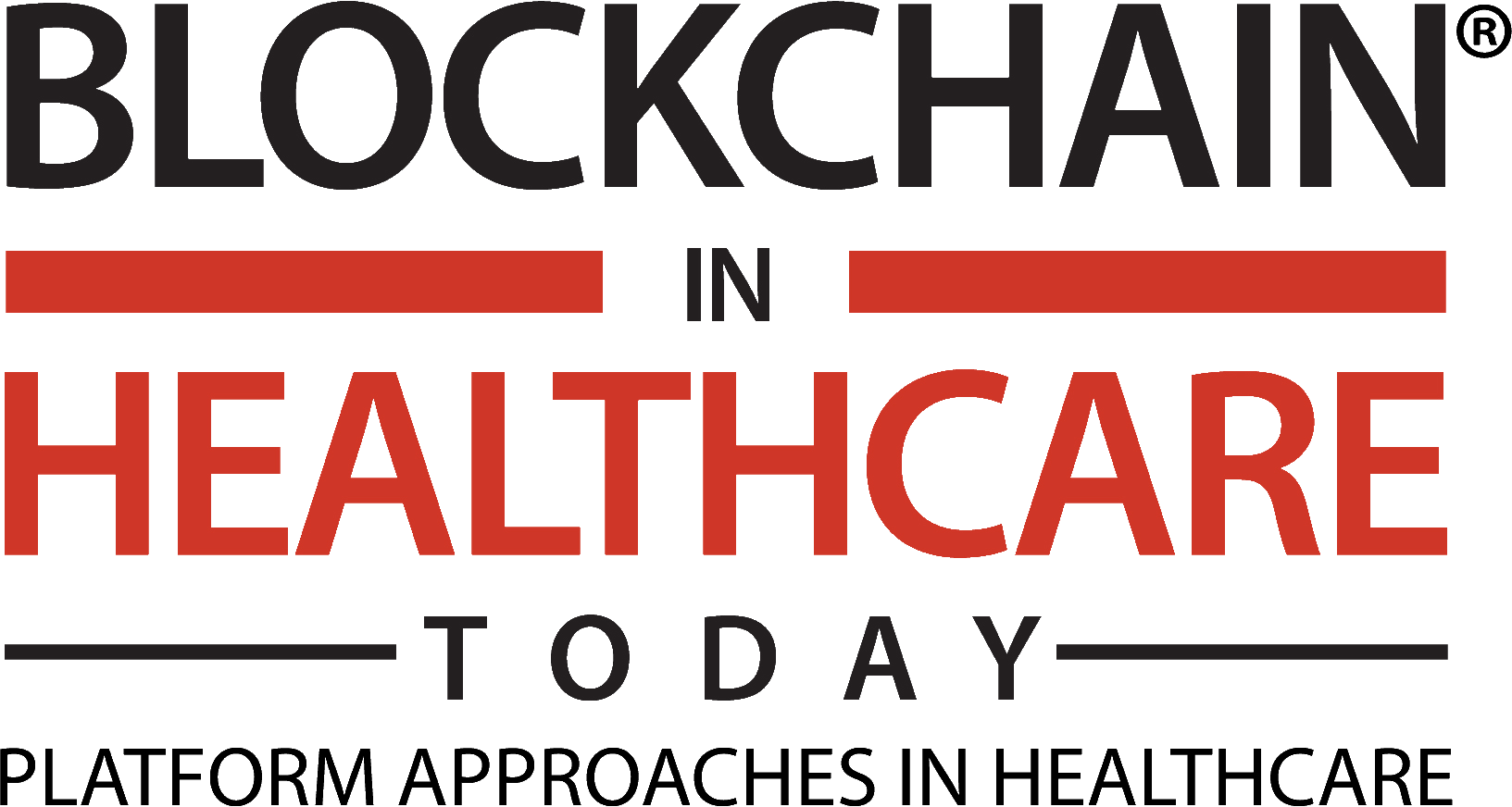Current issue

Volume 7, Issue 3, 2024
Online ISSN: 2573-8240
Volume 7 , Issue 3, (2024)
Published: 16.12.2024.
Open Access
Blockchain in Healthcare Today (BHTY) is the leading international open access journal that amplifies and disseminates platform approaches in healthcare and distributed ledger technology research and innovations. Fields of interest include healthcare information systems, leveraging data science tools and techniques, interoperability, consent mechanisms, privacy preservation, security of health data, clinical trials management, supply chain management, revenue cycle automation, immersive technologies, tokenomics, governance, regulation, network technologies, clinical computing, cryptography, and failed experiments in this expanding specialty field of research.
All issues
Contents
29.11.2018.
Track: Telehealth
MUSC National Beacon of Telehealth Excellence: Case Use for Future Deployment
Session Description: In 2017 MUSC was one of two academic health systems recognized by the federal government as a Telehealth Center of Excellence. The Health Resources and Services Administration gave MUSC this designation in recognition of MUSC’s expansive breadth and depth of telehealth services, most of which are in medically underserved areas of South Carolina, a state with a high burden of chronic disease and health disparities. This panel presentation will include three key leaders of MUSC’s telehealth program and focus on practical strategies organizations can deploy to successfully develop and implement telehealth services. The panel will share the structured, guiding framework MUSC applies to telehealth service development which includes strategy, development, implementation, and continuous quality improvement. Additionally, MUSC will share a value proposition framework for telehealth services, recognizing that financial performance is integral to sustaining and scaling telehealth services. Finally, the session will conclude with MUSC’s aspirational vision for the future of digital discovery and telehealth delivery, offering the potential to transform healthcare.
Dee Ford, Kathryn King Cristaldi, James McElligott, James McElligott
29.11.2018.
Innovation Ignition Competition
2nd Annual Innovation Ignition Competition 2018
The competition invited entries focusing on the following areas:
- Reducing health systems and patient out-of-pocket costs
- Designing for the level of a patient’s mobility
- Educating patients on new technology, use, application, and outcomes
- Enhanced standard of care for care-giving, remote care, elderly care, and urban care
Applicants were asked to demonstrate how products and services directly impact the telehealth and blockchain health technology sectors. Products/services had to be GDPR and/or HIPAA compliant. Contestants submitted detailed applications from which judges selected eight (8) finalists for a 5 minute lightning round pitch conducted at ConV2X.
The Finalists, in alpha order, by company are:
1. AmericanTelephysicians (ATP)
2. BitMED_io
3. Cohealth
4. Debut mHealth's Debut Protocol
5. Digipharm's Reimburse
6. Happify
7. Health Innovation's WillChain
8. Knowmadics
We congratulate the 2nd Annual Innovation Ignition Competition Winners:
1st Place: Happify Health
2nd Place: BitMEd
Honorable Mention: WillChain
Judges used six criterion to select winners: (1) identification of medical problem, (2) technical solution, (3) relevance to healthcare sector and technology, (4) ability to monetize, (5) caliber and expertise of team, and (6) overall impression.
Judges:
Bryan Arkwright Managing Consultant / Professor, Schumacher Clinical Partners / Wake Forest University School of Law
Fennie Wang COO and Chief of Regulatory, OpenWater Capital
Anton Decker President, Health Innovation, Bon Secours Mercy Health
Gary German Founder, and CEO, Nonnatech
Gil Alterovitz, PhD Faculty, Harvard Medical School/Boston Children's Hospital, Massachusetts Institute of Technology, Harvard Medical School
John D. Halamka, MD, MS John D. Halamka, MD, MS, CIO, Beth Israel Deaconess Medical Center, Chairman, New England Healthcare Exchange Network (NEHEN), Co-Chair, HIT Standards Committee, Professor, Harvard Medical School, Beth Israel Deaconess System
Karim Babay CEO & Chief Investment Officer, Intrinsic Value Investment Partners
29.11.2018.
Track: Telehealth
Leveraging Remote Patient Monitoring to Manage Chronic Disease
Session Description: Mississippi understands the challenges and costs of a patient population with chronic diseases. The University of Mississippi Medical Center’s (UMMC) Center for Telehealth has a mission to bridge the gaps in the healthcare delivery system in order to improve the health of all Mississippians. Telehealth is able to connect rural residents to the specialists at the larger tertiary centers in the state, thus increasing access. In August 2014, the UMMC Center for Telehealth launched The Mississippi Diabetes Telehealth Network to pilot an advanced healthcare model on patients with uncontrolled diabetes living in the Mississippi Delta. The model employs evidenced based practice, multidisciplinary teams, and individualized nursing interaction in an effort to empower patients to better manage their diabetes. Our program focuses on decreasing health disparities; managing chronic diseases; reducing emergency room visits, hospital admissions and readmissions; and improving health quality while reducing the overall cost of care.
Topics include:
- Clinical outcomes from pilot and how it paved the way for reimbursement in Mississippi
- Cost effective care model for chronic disease management for patients living in under served areas.
- The need for collaborative approach to managing chronic disease
Rajiv Leventhal, Michael Adcock
29.11.2018.
Track: Telehealth
Improving Healthcare Outcomes With Next Generation Internet (NGI): Global Case Study
Session Description: Addresses the challenges and opportunities in improving healthcare outcomes with advanced technologies and Telehealth. From blockchain, to artificial intelligence, to quantum computing, and the next generation internet, we will discuss how advanced technologies can address the needs for personalized medicine, patient-centric healthcare, and leveraging the vast amount of data being captured today and in the future. Many data elements from petabytes of genomics data, to RWE (Real World Evidence), to implanted chips in patients, to WAMIII - Wearables and Medical Internet of Things Interoperability and Intelligence - are part of the evolving health IT landscape. With all this data, the TIPPSS elements are increasingly important - the Trust, Identity, Privacy, Protection, Safety and Security - of devices, data and patients. Join us for an informative and thought provoking session on the promise and perils of this highly connected world, and how the Next Generation Internet can be part of the solution.
Shawnna Hoffman, Florence D. Hudson, Carlo Piraino
29.11.2018.
Track: Telehealth
Improving Provider Data Accuracy: A Collaborative Approach Using a Permissioned Blockchain
Session Description: Billions of dollars are spent annually on provider data management, yet provider directories often contain inaccuracies that dramatically increase the cost of care while reducing its quality. This session will provide an overview of why Humana, MultiPlan, Optum, Quest Diagnostics and UnitedHealthcare have formed the Synaptic Health Alliance to explore the use of blockchain technology in tackling the challenge of accurate and efficient provider data management and sharing. It will highlight the current challenges and state of provider data exchange and the goals and approach of the initial pilot project for the alliance.
Learning Objectives :
- Define the current state of provider data exchange
- Evaluate the use of blockchain technology to address healthcare challenges
- Explore how healthcare organizations can work together to leverage blockchain technology to provide more effective patient care
Todd Eury, Kyle Culver, Mike Jacobs
29.11.2018.
Track: Telehealth
Making Telehealth a Strategic Asset to Achieve Efficiency
Session Description: Efficiency is widely recognized as one of the most important concepts in economics and business, a generic definition from Knapp (1984) coins it as 'the allocation of scarce resources that maximizes the achievement of aims'. Organizations, hospitals, and health systems across the world have been implementing telehealth for their patients and employees with efficiency in mind. A variety of benefits and motivations for telehealth exist, this session explores the efficiencies realized (financial, clinical, operational, technical). Leading experts and senior leaders from UnitedHealth Group, Kaiser Permanente, and Cloudbreak Health join this exciting panel to discuss how telehealth has become a strategic asset and made breakthrough efficiency impacts and results in their own and partner/client organizations.
Bryan Arkwright, James Edwards, John Mattison, John Mattison
29.11.2018.
Track: Telehealth
Making the US a Telehealth Ready Nation
David Gruber, Iris Berman, Andrew B. Wilson
29.11.2018.
Track: Telehealth
Telemedicine and Digital Health to Improve the Value of Health Care
Session Description: Telehealth is a new health care delivery model that could provide significant value to patients and reshape the health care system. With the advent of digital health innovation, we have such an abundance of opportunities... the session will address the exciting future of connected medicine and the opportunities we have to make a global difference in patient care.
Oren Mechanic
29.11.2018.
Track: Telehealth
The Proliferation of Concierge Medicine Business Models in Value Based Medicine
Session Description: In a healthcare landscape that is increasingly shifting to value-based care, some patients are finding the amount of time their primary care physicians have for them dwindling and look for other methods of healthcare delivery to increase communication with their doctors. Many have turned to concierge medicine to address these problems. Here, patients pay an annual membership fee to be part of a concierge medicine model. Doctors will have fewer patients, but spend more time addressing medical concerns and preventing disease among their set of patients.
The session will address how concierge medicine can solve some of the biggest problems around traditional healthcare payment options. Does this model reduce costs in the short- and long-term? What apps are being developed in tandem?
What’s the physician and patient perspective toward concierge medicine?
Rajiv Leventhal, Jay Parkinson, Sandeep Pulim






